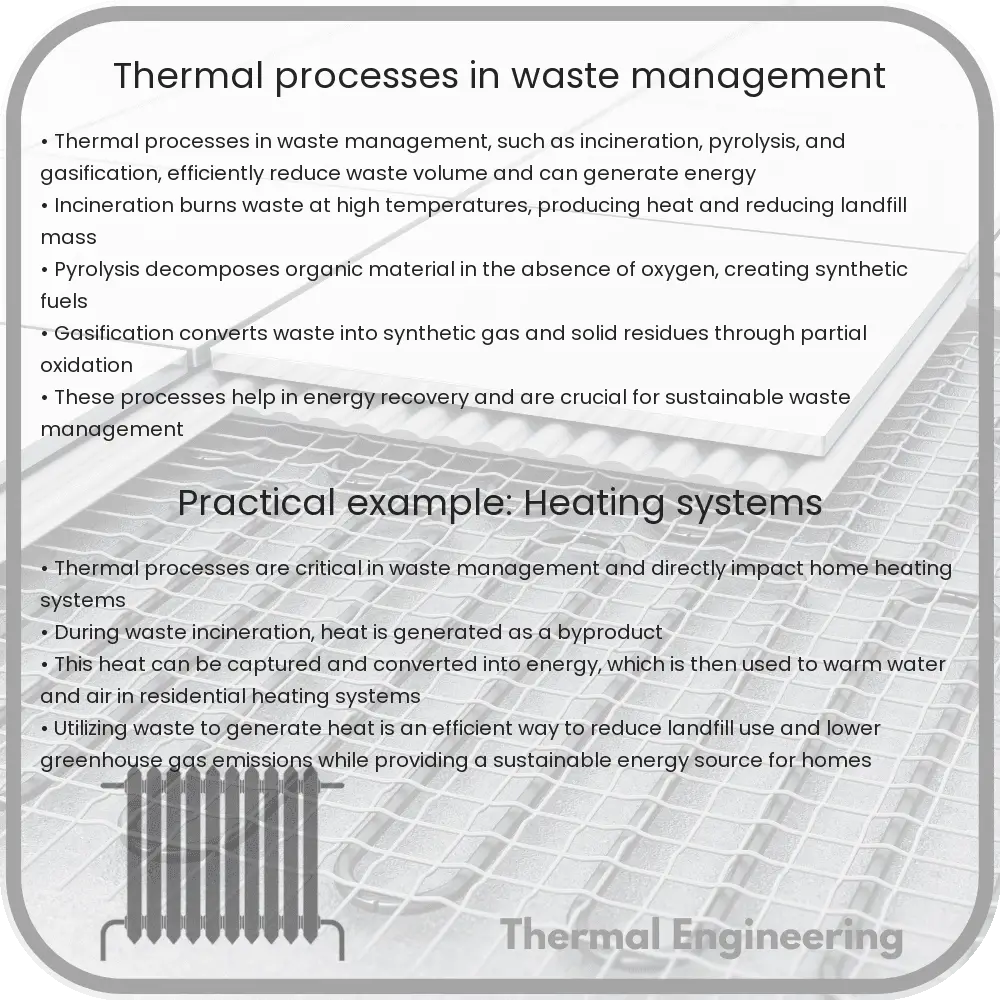Explore how thermal processes like incineration, gasification, and pyrolysis are vital in modern waste management for reducing waste volume and recovering energy.

Understanding Thermal Processes in Waste Management
Thermal processes are at the heart of modern waste management, providing a means to reduce the volume of waste, recover energy, and minimize the environmental impact of waste disposal. These processes involve the application of high temperatures to treat waste materials, transforming them into more manageable forms and, in many cases, generating usable energy. By leveraging the principles of thermal dynamics, these processes play a pivotal role in sustainable waste management strategies across the globe.
Types of Thermal Treatment Processes
There are several key thermal processes used in waste management, each with its own specific applications and advantages:
- Incineration: This is the combustion of organic substances contained in waste materials. Incineration is a widely used process that reduces the mass of the waste and generates heat, which can be converted into electricity. The process also requires air pollution control systems to manage the emissions produced.
- Gasification: Gasification involves the conversion of organic materials into carbon monoxide, hydrogen, and carbon dioxide through partial oxidation at high temperatures. This synthesis gas (syngas) can be used as a fuel to generate electricity or as a basic chemical feedstock in industrial processes.
- Pyrolysis: Pyrolysis is a process of chemically decomposing organic materials at elevated temperatures in the absence of oxygen. This process typically yields a solid residue known as char, a liquid called pyrolytic oil, and syngas, all of which can be utilized as energy sources or raw materials in various applications.
Energy Recovery and Environmental Impact
One of the significant advantages of thermal treatment processes is the recovery of energy from waste materials. The heat generated during processes like incineration and gasification can be converted into steam that powers turbines to produce electricity. This not only helps in reducing the dependence on fossil fuels but also plays a crucial role in the management of municipal solid waste.
However, the environmental impact of thermal processes must be carefully managed. Emissions of pollutants such as dioxins, furans, and heavy metals can pose health risks and environmental damage. Modern waste treatment facilities are equipped with advanced air pollution control systems to capture and treat these emissions effectively. Furthermore, the ash produced by incineration processes must be handled and disposed of properly to prevent any environmental contamination.
Challenges and Innovations
The implementation of thermal processes in waste management faces several challenges. High operational costs, the need for skilled operation, and strict regulatory frameworks can pose barriers to the adoption of these technologies. Additionally, the public perception of incineration-based methods can sometimes be negative due to historical pollution issues.
In response to these challenges, continuous innovations are being pursued in the field. Advances in thermal technology are making processes more efficient and environmentally friendly. For example, improvements in gasification technology are allowing for the treatment of more diverse types of waste with greater efficiency. There is also a significant focus on integrating thermal treatment facilities with recycling and biological treatment methods to create comprehensive waste management solutions that maximize resource recovery and minimize environmental impact.
Conclusion
Thermal processes play an indispensable role in modern waste management systems. By understanding the principles behind these processes and continuing to improve the technologies, societies can better manage their waste, reduce environmental impacts, and move closer to sustainable waste management solutions. Though challenges remain, the ongoing innovations in thermal waste treatment promise a cleaner, more energy-efficient future in waste management.